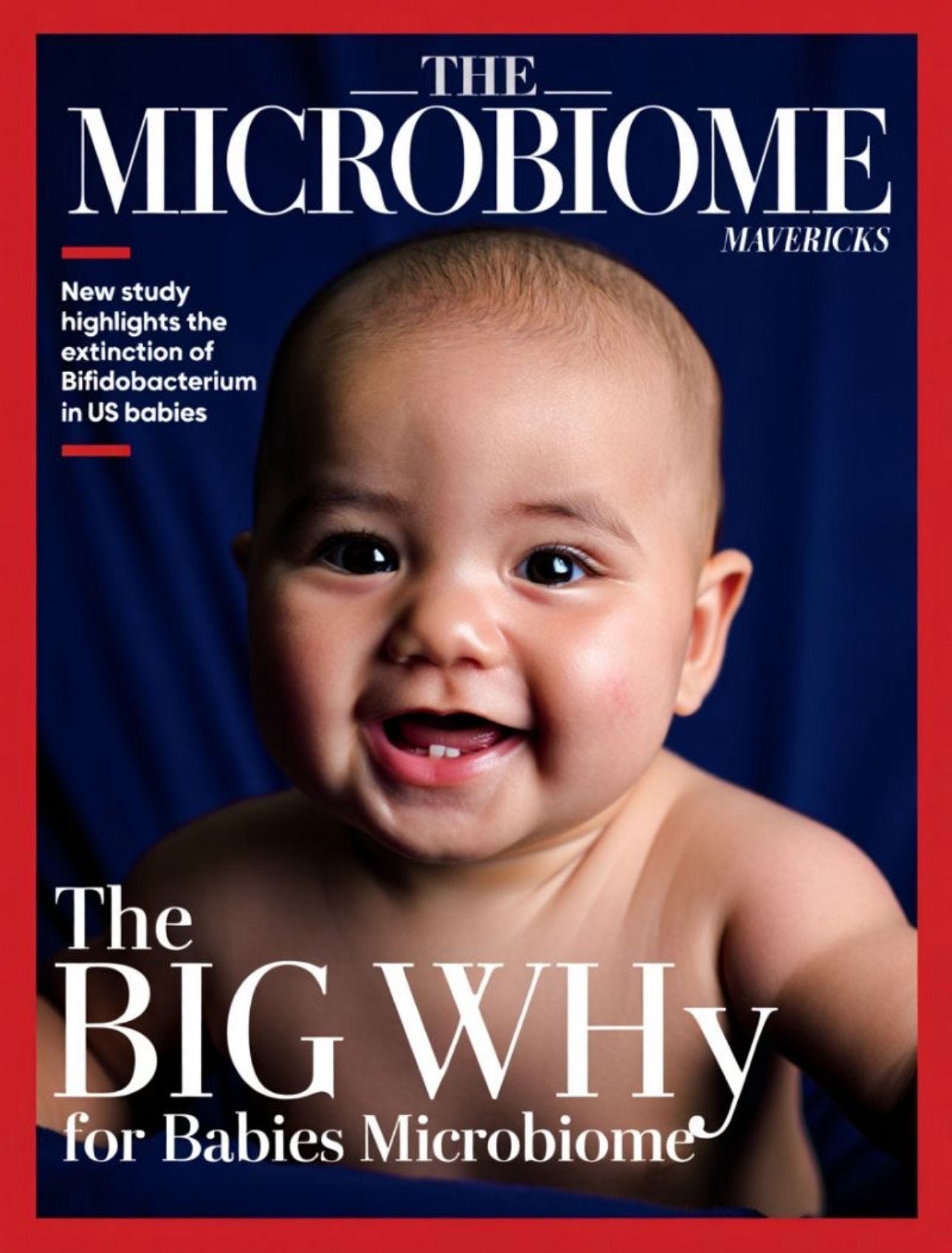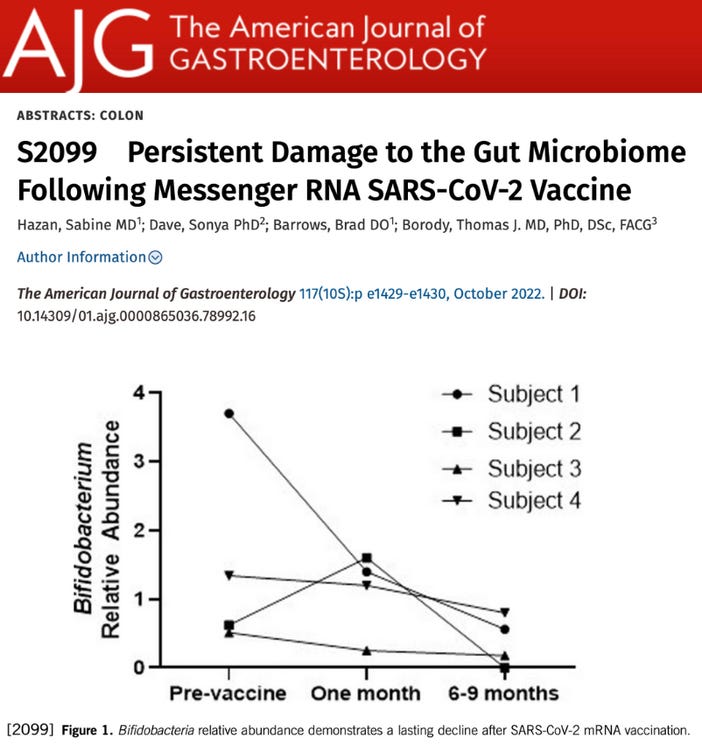1 in 4 U.S. Infants Has No Bifidobacterium, Landmark Study Finds
The missing microbe plays a critical role in healthy development — and its absence triples the risk of allergies, asthma, and eczema in early childhood.
First reported by TrialSite News, a landmark new study titled “Bifidobacterium Deficit in United States Infants Drives Prevalent Gut Dysbiosis” reveals that roughly 24% of U.S. infants entirely lack detectable levels of Bifidobacterium — a cornerstone gut microbe critical for immune training and healthy development.
The My Baby Biome study is the largest nationwide investigation to date of infant gut microbiomes and metabolomes:
How the Study Was Done
Participants: 412 infants from 48 U.S. states, reflecting national racial, geographic, and birth mode diversity.
Age at sampling: 1–3 months old — a critical window before solid food introduction.
Data collected: Fecal samples, feeding/birth data, health status at 2 years.
Analyses performed:
Whole-genome metagenomics for microbial composition and functional capacity
Metabolomics to measure 79 metabolites linked to immunity and development
Longitudinal health surveys evaluating allergies, eczema, asthma diagnoses
Cluster analysis: Infants were grouped into 3 microbiome types (C1–C3) based on gut composition.
What the Study Found
24% of U.S. infants had no detectable Bifidobacterium.
Even among vaginally delivered, breastfed infants, absence was common.
B. infantis, a crucial immune-supportive species, was detected in only 8% of infants.
Widespread immune-related disease by age 2:
30% of infants had been diagnosed with allergies, eczema, and/or asthma.
Risk was 3x higher in infants with dysbiotic microbiomes (C2 and C3 clusters).
Protective effect of B. breve:
Infants colonized with B. breve had a 4.8-fold lower risk of developing immune-related diseases.
B. longum had a weaker, non-significant protective effect.
C-section and breastfeeding can backfire together.
In C-section babies, breastfeeding often failed to establish Bifidobacterium — and instead enabled harmful competitors like Clostridium perfringens to colonize the gut.
Breastfeeding supported pathogens in dysbiotic guts:
In the absence of Bifidobacterium, breast milk oligosaccharides (HMOs) were consumed by opportunistic species — creating a pro-inflammatory metabolic profile instead of a protective one.
Pathogens hijacked HMO metabolism:
C. perfringens and Klebsiella pneumoniae exploited the HMO niche meant for Bifidobacterium, but lacked the full enzymatic machinery — degrading host-derived compounds inefficiently and harmfully.
Elevated antimicrobial resistance and virulence factors:
Infants lacking Bifidobacterium had higher levels of AMR genes and virulence factors, including lipopolysaccharide (LPS) synthesis and phage-associated genes.
These infants were more likely to harbor hostile microbial environments — even at just 1–3 months of age.
Disrupted metabolic signaling in dysbiotic infants:
Lower production of indole-3-lactate (ILA) and thiamine — both essential for immune tolerance and neurodevelopment.
Higher gut pH, altered bile acids, and a shift toward butyrate production (linked to Clostridium species) were also observed in dysbiotic profiles.
The industrialization of childbirth, infant nutrition, and environmental exposures appears to be erasing a keystone strain from the infant gut microbiome — Bifidobacterium, a group of beneficial bacteria critical for immune imprinting and early metabolic health. This foundational collapse leaves babies more vulnerable to immune dysfunction, allergic disease, and chronic inflammation from the start.
The introduction of synthetic mRNA injections may further exacerbate this crisis. Hazan et al found a persistent decline in Bifidobacterium abundance in all subjects 6–9 months following COVID-19 mRNA injection — with levels in each individual falling below 1% relative abundance, regardless of prior baseline:
If you want to learn more about the critical importance of the microbiome, I recommend you watch the following interview with gastroenterologist and microbiome expert Dr. Sabine Hazan:
Epidemiologist and Foundation Administrator, McCullough Foundation
www.mcculloughfnd.org
Please consider following both the McCullough Foundation and my personal account on X (formerly Twitter) for further content.






The missing link in the Medical Community is Nutrition...it is not emphasized in med school.
When I had three of my children back in the 1956, 1959 and 1965, I never thought to ask what items were in these shots. I didn't learn, until about 2010... I was appalled at the toxic substances, which were in these injections, when I read Vaccination is NOT Immunization by Dr. Tim O'Shea. I gave my first son shots, which caused 106 temperatures and screaming for 16 hours. I called the doctor and he said that it was to be expected. It showed the vaccines were working. I slacked off giving my two girls vaccines, because of my son's reactions. In 1961, a friend handed me some health and nutrition books...and said, "Start reading You are following the wrong people." After opening the first book, I learned the doctor I trusted had caused all of my son's problems, between the corn syrup & evaporated milk formula and his other high sugar content food recommendations. They contributed to hyperactivity with the doctor putting him on tranquilizers at 4-1/2 years old. After opening the first book, the first thing I read SUGAR CREATES HYPERACTIVITY. The second thing I spotted TRANQUILIZERS STUNT the DEVELOPING ORGANS of CHILDREN. After reading this, I decided to do my own health research and not depend on doctors for information. When 95% of illness is created by eating the wrong foods and the majority of doctors don't study nutrition - they can't provide the answers their patients need. The patients are handed a prescription, when they need the right nutritional information. I was blessed, when my friend handed me those books 64 years ago. I wouldn't be here today and healthy at 91 years old, if I had not done my own nutrition research. It got me into opening a holistic health center and doing 30 years of nutritional consultations.
It's hard for me to comprehend the madness of any parent wanting to protect a newborn with a vaccine .....how do they they think the human species got here ....? It wasn't through science .....!🤷🏻♂️🤦♂️🙏🏾🙏